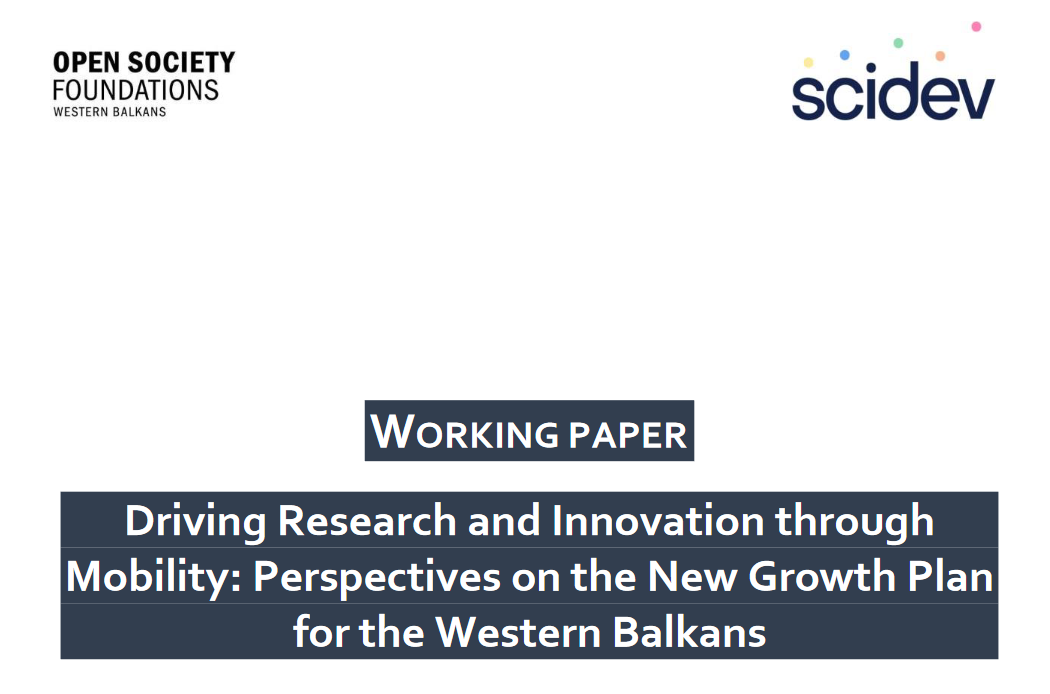The working paper, titled “Driving Research and Innovation through Mobility: Perspectives on the New Growth Plan for the Western Balkans”, is a comprehensive document prepared by the Center Science and Innovation for Development (SCiDEV). It builds upon SCiDEV’s leadership role in the Thematic Working Group on Mobility within the 2023 Civil Society and Think Tank Forum (CSF2023) of the Berlin Process. The paper aims to contribute to ongoing discussions and policy developments related to mobility-driven research and innovation (R&I) in the Western Balkans. The working paper’s development involved extensive stakeholder engagement, including four consultation meetings held between June and October 2023. These meetings brought together 43 participants from diverse backgrounds, including universities, research centres, intergovernmental organisations, civil society organisations, and think tanks from both the WB6 and the European Union. The findings and recommendations were further validated through advocacy visits and networking events in various European cities. This comprehensive approach ensures that the paper reflects a wide range of perspectives and insights on mobility-driven R&I in the Western Balkans. The document reflects on the Chairs’ Conclusions 2023 from the Berlin Process Summit and related policy recommendations. The paper explores the EU’s New Growth Plan for the Western Balkans, analysing its objectives and implications for mobility-driven R&I. Finally, it offers recommendations for strengthening the integration of the Western Balkans into the European Research Area (ERA).
The document analyses the EU’s New Growth Plan for the Western Balkans, which aims to bring the region closer to EU membership by offering tangible benefits and financial support. The plan is structured around four pillars: enhancing economic integration with the EU Single Market, strengthening regional economic integration, accelerating fundamental reforms, and increasing financial assistance. It includes a €6 billion Reform and Growth Facility to provide grants and loans to the WB6, conditioned on the fulfilment of specific reforms. The paper in particular examines how research and innovation are positioned within the Reform Agendas of each WB6 for 2024-2027. It highlights specific targets and initiatives, such as Albania’s focus on adopting a Smart Specialization Strategy, Serbia’s aim to increase private sector expenditure on R&I, and North Macedonia’s plans to introduce a matchmaking system between SMEs and EU funding opportunities. The working paper also analyses the 2023 Enlargement Packages for the Western Balkans, revealing a mixed picture of progress and persistent challenges in R&I. Common issues across the region include the need to increase national funding for R&I, slow progress in adopting Smart Specialisation Strategies, and the absence of reliable data systems for science and technology. The document emphasises the importance of enhancing participation in the Horizon Europe programme and addressing gaps in current support mechanisms for R&I in the region.
The working paper concludes with a set of comprehensive recommendations aimed at advancing R&I in the Western Balkans and accelerating the region’s integration into the European Research Area (ERA). Key recommendations include increasing national funding for R&I, with Western Balkan countries urged to prioritise raising their investment to align with EU benchmarks. The paper emphasises the importance of adopting and implementing Smart Specialisation Strategies (S3) by December 2024, ensuring these strategies are aligned with regional strengths and EU objectives. Establishing reliable data systems for R&I is highlighted as essential for evidence-based policy-making and monitoring progress against EU standards. The document proposes creating a dedicated R&I funding facility under the Western Balkans Investment Framework (WBIF) to address specific regional needs. It also recommends enhancing participation in the Horizon Europe programme through targeted outreach and capacity building. Strengthening academia-industry collaboration and promoting regional cooperation and knowledge-sharing are identified as crucial for driving innovation and addressing common challenges. Regarding the implementation of the Reform Agendas for 2024-2027, the paper recommends engaging stakeholders in the approval process, aligning agendas with national and EU priorities, and allocating adequate resources. It stresses the importance of establishing strong coordination mechanisms, regular monitoring of progress, and conducting comprehensive evaluations. The recommendations emphasise the need for transparency and accountability throughout the process, with regular communication of progress to stakeholders and the public.
Overall, the working paper underscores that implementing these recommendations will require sustained political commitment, close cooperation between various stakeholders, and strategic use of available EU support instruments. By addressing these key priorities and leveraging opportunities provided by the EU’s Growth Plan and the region’s Reform Agendas, the Western Balkans can unlock their R&I potential and accelerate their socio-economic development and integration with the EU.
For more information, please refer to the source of this document: https://scidevcenter.org/wp-content/uploads/2024/08/ok-SCiDEV-Working-Paper-New-Growth-Plan-and-Research-and-Innovation.pdf

